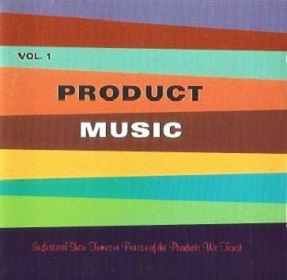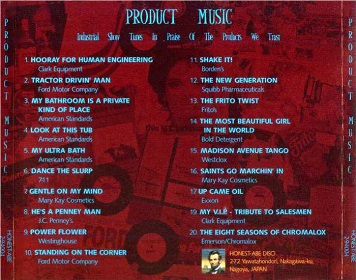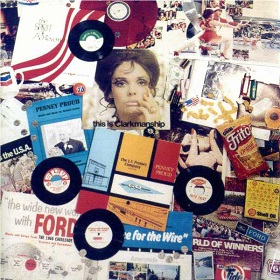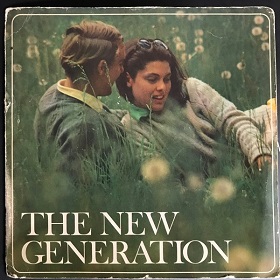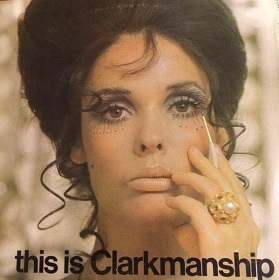The Atrocious Music Collection: #17 in a series
Artists: Various
Album Title: Product Music Vol. 1: Industrial Show Tunes In Praise of Products We Trust
Category: CompilationYear: 1996 (songs from 1950s to 1970s)
Cover art style: A Corporate Rainbow
Audio samples:
- American Standard: My Bathroom is a Private Kind of Place
- American Standard: Look at This Tub
- Ford Motor Company: Tractor Drivin' Man
- Exxon: Up Came Oil
- 7-11: Dance the Slurp
- Firto's: The Frito Twist
- Westinghouse: Power Flower
- Squibb Pharmaceuticals: The New Generation
- J.C. Penney's: He's a Penney Man
- Clark Equipment: My V.I.P. - Tribute to Salesmen
Click on picture for full-sized image
Product Music, Vol. 1 was released by Honest Abe Discs (complete with a logo which is a picture of President Lincoln), which is an odd name for a record label based in Nagoya, Japan. The album is a compilation of advertising and corporate music from the 50s to the 70s "made available on a limited basis as a historical and research sound-document only," which seems a half-hearted attempt to get around copyright violations, which is an ironic move considering the disc celebrates corporate-created art. (There is no indication there has ever been a volume 2, by the way.)
There are several different sub-genres represented here, but by the far the most fascinating are the songs from the corporate musicals – sometimes called industrial musicals – which flourished at the Fortune 500 company conventions, mostly in the 1960s. The idea that these companies would pay composers and lyricists, sometimes the same folks creating Broadway shows, to create shows which would only be seen by their employees (who would usually receive a souvenir LP to take home) at these conventions might seem crazy nowadays, but go Google what crazy things tech companies like Google do now for their corporate events.
Regardless, if you want a full taste of what this looked and sounded like, check out this 1950s Chevrolet Sales Convention Musical, complete with sets and costumes, which you can watch at https://archive.org/details/Chevrole1954.
Nothing from the Chevy show is, alas, on this CD, but it does have songs from a 1969 show created by plumbing fixture maker American Standard called The Bathrooms are Coming. American Standard explained it thusly:
"The Bathrooms Are Coming premiered a new decade of bathroom fixtures born out of exhaustive human and product research by American-Standard. The story began with the introduction of a mythical Greek goddess Femma, the epitome of all women’s attitudes, reflections and desires and the leader of all women’s movements. In the play Femma is called upon by other women to start a bathroom revolution – ‘Join the fight for bathroom safety, Femma … the fight for beauty and luxury. We need freedom from bathroom oppression. Join the fight for better bathrooms.’”
So...can't really begin to comment on all that.
The Bathrooms are Coming gave us tunes such as My Bathroom is a Private Kind of Place and Look at this Tub, and they are spectacular, with lines like this:
making faces at my face...
[The only room] where I can get away from all
and really feel in bloom.
(The jarring implicit sexism here will come up again. No surprise, I guess, given the overwhelmingly male workforces of the time.)
You might even be able to slip some of these corporate show tunes into Broadway musical with hardly a bump. For example, I could imagine both Ford’s Tractor Drivin’ Man and Exxon’s Up Came Oil in Oklahoma! (For the record, Up Came Oil is one of my personal favorites on this disc.)
There is another type of song represented here which was intended for the general public. The dance songs The Frito Twist and 7-11’s Dance the Slurp were 45 singles from the early 60s and early 70s respectively. These novelty tie-ins were just another form of marketing, so are not nearly as jarring as the company musicals.
The changing culture in the late 1960s and early 1970s led to some less obvious, and more ham-handed, musical corporate gestures. Westinghouse’s Power Flower awkwardly tries to marry folksy hippie culture with… well, Westinghouse. At least this connection is made clear. Squibb Pharmaceuticals' The New Generation avoids mentioning both “Squibb” and “pharmaceuticals,” or really anything beyond a pablum of hippie keywords and pharses such as "love," "every man is a brother," "love," "all races and religions," "joy," "love," and "love."
The New Generation was actually the title track of a “film” produced by Squibb Pharmaceuticals to promote their new oral contraceptive, as we might have guessed from the album cover:
The last category of songs here is the most interesting from a corporate anthropology stand-point, I think. These are tunes that are targeted right at the company salesmen (and they were overwhelmingly men), with inside jokes and references. In general, these corporate shows were focused on offering these salesmen moral support and to generate enthusiasm for the new products and the brand in general. J.C. Penney's He's a Penney Man even includes soft digs at upper management, the type of inside grousing that might occur regularly around the watercooler. Note also the insider lingo - this is certainly not for the public:
And he goes for his D.M. and his E.M., too
Oh man. He's a Penny Man...
If he looks at the kind of stuff the buyer picks
And he knows he's in the hands of lunatics
Oh man. He's a Penny Man.
There’s no doubt that Clark Equipment’s My V.I.P. is the most shocking of all of the tracks on this record. Addressed not to the salesmen, but their wives, this 1970 show tune was part of This is Clarkmanship, written by composer Norman Paris. (Paris was the husband of Annie Tony-winner Dorothy Loudon, the original Miss Hannigan. He wrote songs for a number of films and was the arranger for Paul Simon’s Still Crazy After All These Years.)
This is not a subtle song, and the theme is one of Stepford-wife subservience to their Clarkson salesmen husbands that has to be heard to be believed. The chorus has this refrain, for example:
We gave up living when we choose out lives
So, while Westinghouse and Squibb were courting the new flower-power generation, Clark Equipment was clearly stuck in the Stone Age, at least behind closed corporate-only doors. And maybe that’s the real fascination with these musicals, that they weren’t intended for the public, and therefore show a bit of the true face of corporate America to us, one that can be quite revealing.

